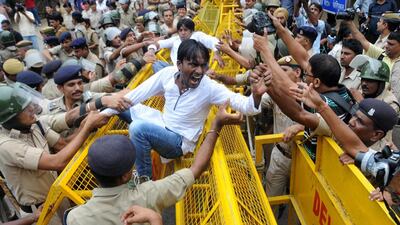In the context of India and Pakistan one thing is certain. Whatever happens, each country, rightly or wrongly, will accuse the other – and there are a lot of accusations flying around at the moment. Let us consider some recent events to see if we can connect the dots reasonably.
Firing across the Line of Control (LoC) in Kashmir has been going on for the past three months. Numerous events have also occurred on the sidelines. Indian support for Pakistani insurgents has become accepted as fact. But the recent disclosure that a Pakistani political party was being funded by the Indian intelligence agency created a whole new furore.
Just as the media picked up the news that Pakistan intended to take its evidence to the UN, India’s prime minister Narendra Modi agreed to meet Nawaz Sharif, his counterpart, in Russia. The meeting was reported as being cordial.
Days later, an Indian drone entered Pakistani airspace and was shot down – an incident that only served to escalate tensions on the LOC once more.
As if that were not enough, a terrorist attack occurred in Gurdaspur, India, last week, of which Pakistan is presumed guilty.
The Indian version is that the attackers crossed over the Ravi river. Last week, the Ravi was in low to medium floods (the first Indian response to the attack was to release more water in the Ravi, raising it to high flood). Furthermore, the entire border is protected by a high barbed-wire fence lit by floodlights, and manned round the clock.
The terrorists could, of course, still have broken through these defences. But, if they were that well-trained and briefed, they must have been incredibly stupid to take a “fortuitous” turn to the right and enter a “near-empty police barracks rather than a bustling residential police complex on the left”, to quote from The Economic Times.
What is fascinating is the fact that well before the perpetrators were even identified, some Indian officials were already accusing Pakistan.
The only “hard evidence” offered so far are GPS systems carried by the three attackers, but even I am aware that any bright teenager could hack a GPS and alter the information on it to show almost anything they want. Is this all the “hard evidence” India has to prove Pakistan guilty?
Mr Modi has an established position against Pakistan and has been wholly unapologetic for any incidents that occurred before he was elected to higher office.
As early as May last year, the magazine The Diplomat reported that Mr Modi might be “interested in cross-border-covert ops against Pakistan”.
The Hindustan Times reported that former Indian army chief, V K Singh, acknowledged that a special unit had been raised under him to carry out covert operations, including terrorist attacks and supporting terrorists in Pakistan.
Unlike many Pakistanis and Indians, I have never been a conspiracy theorist. But when there is sufficient method in the apparent madness, one has to accept the possibility, however reluctantly. Recent events certainly appear to be well-orchestrated.
When Zbigniew Brzezinski wrote Game Plan in 1986, he was convinced that the USSR was a permanent and implacable enemy of the US. If my conclusions are correct, it seems that Narendra Modi’s government looks at Pakistan through similarly jaundiced lenses.
Mr Sharif, too has a well-established position towards India. He will respond favourably to any friendly overture. A laudable policy. Every nation should seek to improve relations with its neighbour, but only if it is reciprocal.
I still hope that the error is in my assessment. If it isn’t, we have a difficult road ahead of us.
Brig Shaukat Qadir is a retired Pakistani infantry officer

